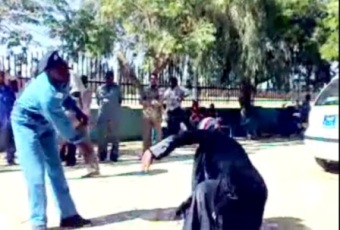Sudan among world’s top failed states: report
June 19, 2012 (LONDON) — The Republic of Sudan is the third on the list of the world’s failed states, after the Democratic Republic of Congo (DRC) and Somalia respectively, the latest edition of the Failed States Index (FSI) has revealed.

Sudan, according to FFP, made very few “improvements” since the advent of the FSI ranking seven years ago. In that time Sudan has twice topped the list.
“Indeed, Sudan faces large-scale instability in its political, social, and economic realms, fed on by widespread ethnic, religious, and political armed conflicts throughout the country,” the eighth edition of the report says.
Specifically cited in the report, which will be officially launched in July, is Sudan’s rapidly declining economy, worsened by South Sudan’s secession last year. Khartoum is still struggling to cope with the loss of 75% of it oil revenues, which had been shared under a 2005 peace deal.
“Sudan must now work hard to develop its other struggling sectors, despite its decrease in GDP [Gross Domestic Product] growth. Violence and allegations of torture and rape committed by all parties, moreover, continue to mire the country’s record,” the FFP report says.
“These and other outstanding issues underline Sudan’s great need for a stronger, more legitimate government willing to protect its people and enact large-scale reform,” it adds.
SOUTH SUDAN
The Republic of South Sudan, which attained independence less than a year ago would have been ranked “approximately fourth” behind Sudan, according to FFP, due to its “fragile” infrastructure, severe poverty, weak government, fraught relations with Sudan and heavy reliance on oil revenues.
South Sudan faces some of the worst health and education indicators worldwide,” the report says, citing widespread violence as having immensely brought politics the economy, and transportation and public service to a halt.
“Indeed, South Sudan’s rampant insecurity has forced the government to spend its resources combating threats instead of promoting overall growth and development,” it adds.
Despite the separation, active conflict between the neighbouring states has continued in 2012 along their disputed border.
“South Sudan’s contemporary history as a nation is short and is focused primarily on its separation from the north. This year, more than any other, the scores of the two nations are intertwined. Because the split happened halfway through the year, the consequences and reactions are reflected clearly. It is important to look at where there are differences in the scores of the two countries. South Sudan has inherited many social and political problems from the older nation,” the report says
Failed States Index
The FSI report, to be officially launched in Washington DC next month, however, credits the world’s newest nation for having reportedly scored slightly better in terms of state legitimacy and human rights.
Somalia topped the list of failed states for the fifth consecutive year, mainly due to “widespread lawlessness, ineffective government, terrorism, insurgency, crime, and
well-publicized pirate attacks against foreign vessels.
At the other end of the scale, Finland is said to have remained in the best position, with its Scandinavian neighbours Sweden and Denmark respectively. The trio reportedly benefit from strong social and economic indicators, paired with excellent provision of public services and respect for human rights and the rule of law.
The FSI ranks 178 countries using 12 social, economic, and political indicators of pressure on the state, along with over 100 sub-indicators. These include such issues as Uneven Development, State Legitimacy, Group Grievance, and Human Rights.
Each indicator is rated on a scale of 1-10, based on the analysis of millions of publicly available documents, other quantitative data, and assessments by analysts. In this case, a high score reportedly indicates high pressure on the state, and hence a higher risk of instability.
Krista Hendry, the Executive Director of FFP, said the value of the FSI is in its application on the ground by governments, media, civil society and others to consider and work to improve the underlying conditions of conflict.
“We assess 178 countries because we recognize that all countries have pressures upon them that need to be managed. The difference between livelihoods within the countries is largely a product of the capacity of the state and society,” Hendry says in the report.
The Fund plans to develop a capacity index to test its assumption
that states manage pressures better when they have open societies with
strong state institutions based on the rule of law and democracy, she
adds.
The FSI 2012, which will be formally launched on 13 July in Washington DC, also highlights the decreased rankings among countries affected by last year’s Arab Spring, including Bahrain, Egypt, Libya, Syria and Tunisia. Libya’s decline was reportedly the most remarkable.
Kyrgyzstan, on the other hand, is recognised by the report as the most improved nation, rebounding from a marked fall the previous year that was precipitated by the mid-2010 revolution that led to significant political reforms and ultimately a stable transition of power.
Since its inception, the FSI, produced by The Fund for Peace, is widely considered a critical tool in highlighting not only the normal pressures that all states experience, but also in identifying when pressures are pushing a state towards the brink of failure.
(ST)
